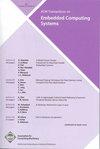串扰:利用冗余网络降低低延迟容错成本
IF 2.8
3区 计算机科学
Q2 COMPUTER SCIENCE, HARDWARE & ARCHITECTURE
引用次数: 0
摘要
实时嵌入式系统在现代世界中发挥着许多重要的作用。在这些系统中容忍错误的标准方法是使用拜占庭容错(BFT)状态机复制(SMR),其中多个副本执行相同的软件,并由执行器比较它们的输出。不幸的是,传统的BFT SMR协议很慢,需要副本在多个回合中来回交换传感器数据,以便在每次执行之前达成一致。减少BFT SMR延迟的最新技术是急于执行,即在不同的处理器内核上同时对来自不同传感器的数据执行副本。然而,与传统的BFT SMR系统相比,该技术的计算开销增加了3 - 5倍,极大地限制了可调度性。我们提出了CrossTalk,一种新的BFT SMR协议,它利用嵌入式系统中冗余交换网络的流行来减少延迟,而无需增加计算。关键思想是当消息从传感器传送到副本时,使用特定的算法在冗余网络平面(许多系统已经拥有)之间移动消息。因此,CrossTalk可以自动确保网络中的协议,从而避免了副本之间的任何通信。我们的评估表明,CrossTalk将可调度性提高了2.13 - 4.24倍。此外,在美国国家航空航天局对真实太空飞行任务的模拟中,CrossTalk可以容忍比现有技术更多的故障,同时使用的处理器时间减少了近3倍。本文章由计算机程序翻译,如有差异,请以英文原文为准。
Real-time embedded systems perform many important functions in the modern world. A standard way to tolerate faults in these systems is with Byzantine fault-tolerant (BFT) state machine replication (SMR), in which multiple replicas execute the same software and their outputs are compared by the actuators. Unfortunately, traditional BFT SMR protocols are slow, requiring replicas to exchange sensor data back and forth over multiple rounds in order to reach agreement before each execution. The state of the art in reducing the latency of BFT SMR is eager execution, in which replicas execute on data from different sensors simultaneously on different processor cores. However, this technique results in 3–5× higher computation overheads compared to traditional BFT SMR systems, significantly limiting schedulability. We present CrossTalk, a new BFT SMR protocol that leverages the prevalence of redundant switched networks in embedded systems to reduce latency without added computation. The key idea is to use specific algorithms to move messages between redundant network planes (which many systems already possess) as the messages travel from the sensors to the replicas. As a result, CrossTalk can ensure agreement automatically in the network, avoiding the need for any communication between replicas. Our evaluation shows that CrossTalk improves schedulability by 2.13–4.24× over the state of the art. Moreover, in a NASA simulation of a real spaceflight mission, CrossTalk tolerates more faults than the state of the art while using nearly 3× less processor time.
求助全文
通过发布文献求助,成功后即可免费获取论文全文。
去求助
来源期刊

ACM Transactions on Embedded Computing Systems
工程技术-计算机:软件工程
CiteScore
3.70
自引率
0.00%
发文量
138
审稿时长
6 months
期刊介绍:
The design of embedded computing systems, both the software and hardware, increasingly relies on sophisticated algorithms, analytical models, and methodologies. ACM Transactions on Embedded Computing Systems (TECS) aims to present the leading work relating to the analysis, design, behavior, and experience with embedded computing systems.
 求助内容:
求助内容: 应助结果提醒方式:
应助结果提醒方式:


